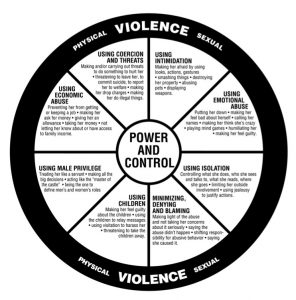|
24/7 HelpLine: 734-995-5444 If you are in immediate danger, call 911. |
Linea de Apoyo de 24 horas: 734-995-5444 Si esta en grave peligro, llame a 911. |
|
24/7 HelpLine: 734-995-5444 If you are in immediate danger, call 911. |
Linea de Apoyo de 24 horas: 734-995-5444 Si esta en grave peligro, llame a 911. |
Domestic Violence Definition:
Intimate partner domestic violence is defined as a PATTERN of coercive behavior used by people to control their intimate partners. It encompasses abusive tactics including, but not limited to, physical and sexual violence; threats of violence; economic, emotional and psychological abuse; and/or the use of privilege.
Like adult domestic violence, teen dating violence is also a pattern of controlling behavior, in which one partner attempts to assert their power through physical, emotional, verbal, psychological, and sexual abuse. This will often be coupled by instances of jealousy, coercion, manipulation, possessiveness and an overall threatening demeanor, many times increasing in severity as the relationship continues. Adolescents’ feelings are often discounted, and their concerns are not taken seriously. As a result, their relationships can be viewed as trivial “puppy love” and the seriousness is often minimized.
Both adult domestic violence and teen dating violence can affect people from all socioeconomic, racial, ethnic, and religious backgrounds, and can occur in all relationships.
The Power & Control Wheel
The Power and Control Wheel is a tool that was developed in Duluth, Minnesota through conversations between survivors and advocates in the 1980s. The model describes a combination of abuse tactics and behaviors used by batterers to maintain power and control in intimate partner relationships.
In these conversations, survivors who participated were all women in intimate partner relationships with men, hence why the wheel is gendered. However, SafeHouse recognizes that abuse can happen to and be perpetrated by people of any gender in an intimate relationship. To learn more about the Power and Control Wheel and see other models, please visit https://www.theduluthmodel.org/wheels/.

Sexual Assault Definition
Sexual assault includes attacks such as rape or attempted rape, as well as any unwanted sexual contact or threats. Usually, a sexual assault occurs when someone touches any part of another person’s body in a sexual way, even through clothes, without that person’s consent. Some types of sexual acts that fall under the category of sexual assault include forced sexual intercourse (rape), sodomy (oral or anal sexual acts), child molestation, incest, fondling and attempted rape. Assailants can be strangers but are more likely acquaintances, friends, or family members. Assailants commit sexual assault by way of violence, threats, coercion, manipulation, pressure or tricks.
5 Tips for Staying Safe
While there’s no way to eliminate the chance that something may happen, there are strategies that may reduce your risk or give you the confidence to step in to prevent a sexual assault. It’s important to remember that if you are sexually assaulted on campus it is not your fault – help and support are available.
Trust your gut & be true to yourself. If something doesn’t feel right, it probably isn’t. If you feel uncomfortable in a situation, trust your instincts and leave. If someone is pressuring you, it’s better to lie and make up an excuse to leave than to stay and be uncomfortable, scared, or worse. Your safety comes before someone else’s feelings or what they may think of you.
Take control of your online life. Be careful online. Think twice before you share personal information. Constantly posting social media updates on your whereabouts, activities, or class schedules may allow someone to track your every move. Use your best judgment when “checking in” on Facebook or Four-square and geo-tagging images you post to Instagram. Remember this motto: If you would not share the information with a stranger, then you shouldn’t share it online.
Make plans & be prepared. When going out, know ahead of time who is going and plan to stay together as a group. Construct a backup plan for the day/night so that all of your friends know where to meet up if someone gets separated and/or their phone dies. Don’t leave someone stranded in an unfamiliar, unsafe situation. Be sure to check that you have everything you need before you leave—a fully charged phone, the number for a reliable cab company, enough cash to get you home, the address to your dorm or college memorized, etc. Keep your phone on you at all times in case you find yourself in an uncomfortable or dangerous situation.
Party smart. Guard your drink at parties. Don’t accept one from people you don’t trust or know well. Stick to drinks you got or prepared yourself. If you go to the bathroom or step outside, take the drink with you or toss it out. It’s not always possible to know if something has been added to someone’s drink. In drug-facilitated sexual assault, a perpetrator could use a substance that has no color, taste, or odor. Keep track of what you’ve consumed so that you can stay in control. If you can’t remember how many drinks you’ve had, that means you’ve had too many. If you feel like you’re getting sick or are too intoxicated, ask a friend to help you get to a safe place or to a hospital.
Be a good friend. Watch out for each other. Stick together in groups, especially when traveling from one place to the next. If a friend is acting in a way that seems out of character, take notice. If he or she is overly intoxicated or seems to need assistance, get them to a safe place and support them. If you suspect that a friend has been drugged or needs medical attention because of over-intoxication or for any other reason, call a resident assistant, campus police, or 911.